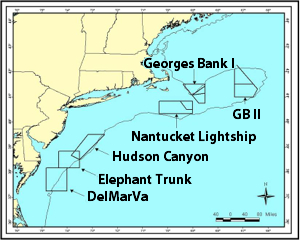Council presents 2018 Award for Excellence to DuPaul
The New England Fishery Management Council has presented its 2018 Janice M. Plante Award for Excellence to Virginia Institute of Marine Science emeritus professor Bill DuPaul, a pioneer of cooperative research in the Atlantic sea scallop fishery.

The NEFMC is one of eight regional councils established in 1976 to conserve and manage the nation’s fishery resources. Its sister agency, the Mid-Atlantic Fishery Management Council, serves states from New York to Virginia and North Carolina. Vessels in Virginia’s scallop fleet fish across the domains of both councils, from the mouth of Chesapeake Bay north to New England.
On a sharp downward slide in the 1990s, the sea-scallop industry is now the second most valuable commercial fishery on the East Coast, with more than $400 million in landings in 2015, and a total economic impact in Virginia of nearly $50 million per year.
Much of that success is due to DuPaul’s early work on ring size in scallop dredges, which revolutionized the fishery’s primary gear type by allowing the release of smaller, younger scallops. This allows scallopers to take advantage of the bivalve’s rapid growth between 3 and 5 years of age, when the animals more than double in weight. By waiting, the scallopers get more meat per shell and a more profitable product.
DuPaul forged and nurtured partnerships with fishermen from the very start of his career, earning industry’s trust and willingness to participate in a range of studies that greatly advanced management of the resource and the fishery. His research included efforts to improve dredge efficiency, enhance scallop quality, and reduce bycatch.
NEFMC Chair Dr. John Quinn, who presented the award, said, “Bill forged and nurtured working partnerships with fishermen at a time when this was a new frontier. He recognized the importance of the scallop fishery and its impacts on businesses and communities throughout our region, and he intuitively knew that solutions to hard problems would come only when people on all sides worked together.”
 Quinn says that DuPaul “earned the deep trust and respect of fishermen from his many years on deck, knee-high in scallop shells and fish slime with the best of them. He proved that cooperative research can break through seemingly insurmountable barriers and help resolve even the most challenging issues.”
Quinn says that DuPaul “earned the deep trust and respect of fishermen from his many years on deck, knee-high in scallop shells and fish slime with the best of them. He proved that cooperative research can break through seemingly insurmountable barriers and help resolve even the most challenging issues.”
VIMS Dean and Director John Wells adds that “Bill is eminently deserving of this recognition. He engaged with industry and other stakeholders throughout his career to better monitor and inform scallop management, a shining example of how science-based guidance can benefit both the sustainability of a natural resource and the success of a fishery.”
David Rudders, a former DuPaul student who currently serves as a senior research scientist and Interim Associate Director for Marine Advisory Services at VIMS, strikes a similar chord. “Bill embodies the true spirit of advisory service and marine extension,” says Rudders. “His career-long engagement with the sea scallop fishery typifies how sound science, a cooperative spirit, and the willingness to have difficult but open dialogues with stakeholders can produce positive outcomes for marine resources.”
Scallop Research Set-Aside
Among many other accomplishments, the NEFMC Excellence Award recognizes DuPaul for his help in developing and supporting one of the scallop industry’s most innovative management approaches—the industry-funded Scallop Research Set-Aside (RSA) Program.
“Bill spent countless hours at sea with fishermen conducting biological studies and annual surveys that have helped gauge abundance and distribution of scallops both on Georges Bank and throughout the Mid-Atlantic,” notes NEFMC spokesperson Janice Plante. “The annual surveys also helped document incoming recruitment, enabling fishery managers to identify and close areas with large beds of seed scallops for additional grow-out. This practice is a bedrock of the current rotational area management program—and one that Bill was in on from the beginning.”
Dupaul was also recognized as a staunch advocate of Scallop RSA Share Days where industry members and scientists gather to openly discuss their research results and exchange ideas about emerging issues.
The NEFMC also credited DuPaul for his role on its Scallop Plan Development Team, Research Steering Committee, Scallop Survey Advisory Panel, and Scallop Stock Assessment Working Group, which is doing the legwork for the upcoming scallop benchmark stock assessment. “As an esteemed veteran of the field,” says Quinn, “his voice is routinely sought after as wise counsel on a multitude of scallop issues.”
Teaching & mentoring
 NEFMC furthermore praised DuPaul for his work in developing the next generation of leaders in fishery science. “Over the years, Bill has trained and mentored dozens of students who now are active contributors to fisheries research and management,” said Quinn.
NEFMC furthermore praised DuPaul for his work in developing the next generation of leaders in fishery science. “Over the years, Bill has trained and mentored dozens of students who now are active contributors to fisheries research and management,” said Quinn.
In addition to Rudders, DuPaul’s former students include Noëlle Yochum, who now leads the Conservation Engineering group at the Alaska Fisheries Science Center; Jeffrey Brust of the New Jersey Division of Fish and Wildlife; and Todd Gedamke, former Chief of NOAA’s Gulf and Caribbean Fisheries office and currently founder and senior scientists with MER Consultants.
